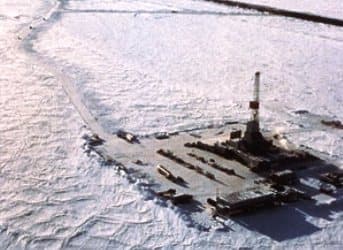The Intergovernmental Panel on Climate Change said Friday the sea ice in the arctic has melted at a rate of at least 9 percent per decade since the late 1970s. That trend should continue because scientists said most of the heat trapped by the rising level of greenhouse gas emissions is stored in the oceans. The report attributed the burning of fossil fuels to at least part of the problem. Melting sea ice, however, has left more of the arctic open to energy explorers for longer periods of time. Advocacy group Greenpeace is making headlines for its Russian campaign but it's done little to discourage energy companies from pushing north.
The IPCC found arctic sea ice has been melting steadily since the late 1970s. By 2050, much of the northern region should be almost ice-free in September. Last week, a freighter carrying coal from Canada made its way through the arctic Northwest Passage for the first time. The Danish operator, Nordic Bulk Carriers, said the shorter route would save $80,000 worth of fuel and cut down on emissions tied to an alternative route, which is about 1,000 nautical miles longer.
Related article: Where's the Next Play for the Giants of Oil?
Qin Dahe, co-chairman of the IPCC working group that published the report, said it was the ocean that took up for more than 90 percent of the energy accumulated in the atmosphere between 1971 and 2010.
"As the ocean warms, and glaciers and ice sheets reduce, global mean sea level will continue to rise, but at a faster rate than we have experienced over the past 40 years," he said in a statement.
That may be good news for the Norwegian energy industry, however. Last year, the industry spent lavishly on new technology used to push oil and natural gas development deeper into the harsh arctic environment. Lead by Statoil, regional efforts for arctic waters range from ice-breaking drill ships to radars used to detect oil spills in the north, where the sun sometimes never breaks the horizon. All told, however, companies operating in the arctic are looking to double the rates of production as new oil and gas fields emerge from beneath the melting ice.
Related article: Greenpeace Pirates Refused Bail in Russia
Dozens of activists with environmental organization Greenpeace were sentenced to jail by a Russian court last week for their role in a protest against a Gazprom drilling rig in the Pechora Sea. Greenpeace International Director Kumi Naidoo said the Russian energy company was operating recklessly while arctic sea ice is "melting before our eyes." Russian President Vladimir Putin, however, said his government was expanding its arctic protection while at the same time linking arctic exploration to the ability to clean up any mess.
The IPCC report is troubling. Though its assessment is that global warming is slowing down, its overall message is cause for concern. Carbon dioxide levels have increased primarily because of emissions tied to the use of fossil fuels. While the renewable energy race picks up, however, there's no pause in the rush to tap into emerging oil and gas reserves even in the harshest of climate scenarios.
By. Daniel J. Graeber of Oilprice.com


















